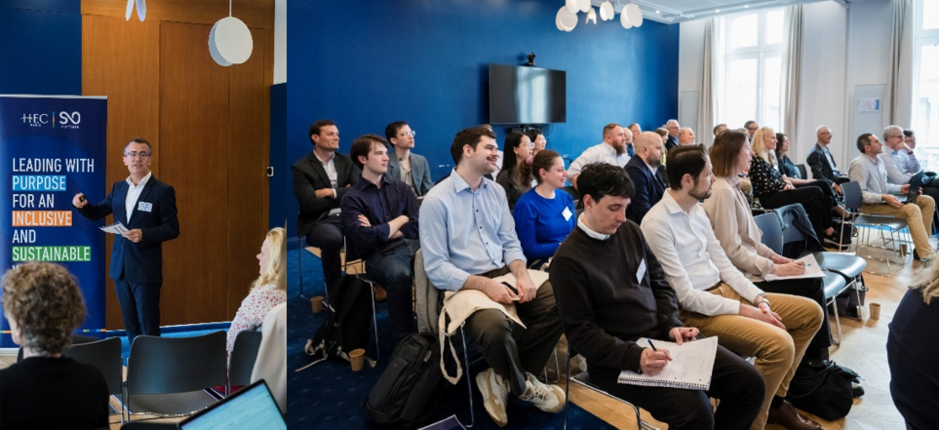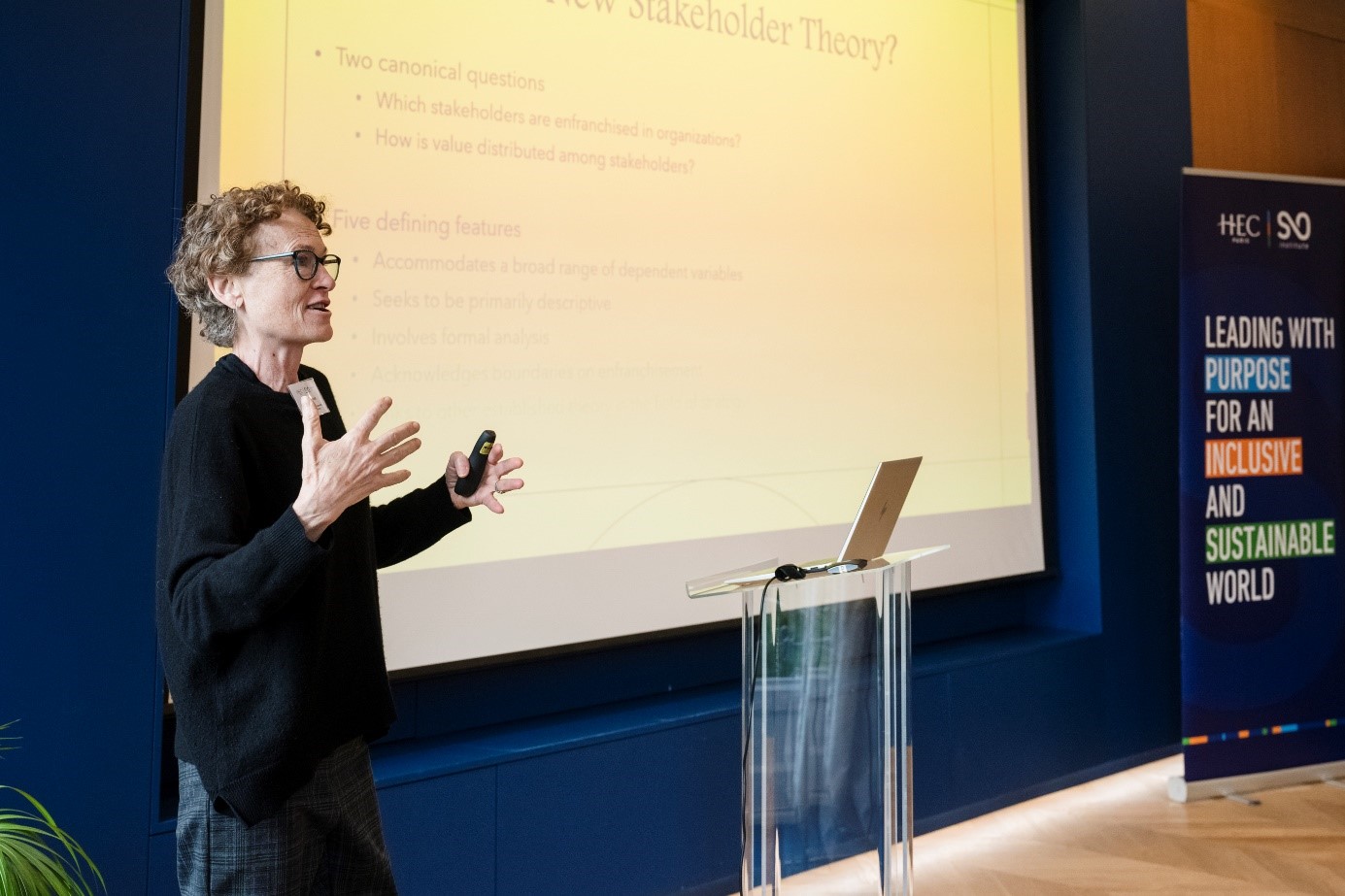Shifting Paradigms in Strategic Management: An Examination of Emerging Stakeholder Theory
Are corporate leaders moral architects? Is corporate purpose a signal meant to assuage stakeholder concerns and enable productive cooperation? ? What is value and how it is created? These were just a few of the questions explored by some of the world's leading experts in stakeholder theory invited to Paris for HEC Paris’ third Stakeholder Strategy Conference. This annual event, organized by the school’s Sustainability & Organizations (S&O) Purpose Center, brought together world-class academics hoping to make progress on unresolved questions in new stakeholder theory.

“It’s so rare to bring together experts around crucial topics in business such as the future of Stakeholder Theory, Stakeholders and Corporate Purpose, and Emerging Questions in Stakeholder Governance. We can’t wait for the fourth edition in 2025.”
With these words, HEC Professor Julien Jourdan closed an intense two days featuring six cutting-edge panel debates and paper presentations on Stakeholder Strategy Governance. Jourdan is Associate Professor of Management and Human Resources at HEC Paris.
For years, he has been researching how stakeholders evaluate organizations in institutionally complex environments and how these evaluations shape company conduct, strategy and performance. At the end of May, he organized with fellow-academic Professor Rodolphe Durand a two-day event addressing the new stakeholder theories challenging strategic management. These are business decision’s trends and its impact on stakeholders such as employees, government, shareholders, suppliers and financers. Jourdain worked tirelessly over the previous year carefully choosing the right balance between seasoned specialists in the field and up-and-coming doctoral students from around the world.

New Stakeholders for New Theories
In the past four decades, the world’s business landscape has been marked by a growing interest in stakeholder theory—a framework that emphasizes the importance of all stakeholders, not just shareholders, in corporate decision-making. This shift reflects a broader recognition that businesses must account for social, environmental, and ethical considerations alongside traditional economic goals. For the past three years, HEC Paris, has been spearheading such reflections, notably in hosting landmark exchanges with scholars at the forefront of this movement. This annual conference provides insight into the evolution of stakeholder theory and its implications for strategic management.
The 2024 Stakeholder Strategy Conference was the latest. “This conference is crucial because it deepens our explorations in a field that takes into account societal concerns,” explained HEC professor Bertrand Quélin who has been involved in the conference since its conception.
“How can we bring in different actors such as customer associations, NGOs, people living in impoverished urban dwellings?”
New stakeholder actors inevitably question old stakeholder theories. The academics shared concerns over climate, resources, housing and politics, to name but a few. They discussed ways to bring in stakeholder theories that revamped those pioneered by Ed Freeman over 40 years ago. Quélin has been working with HEC doctoral student Marc Legrand on long-term approaches to alleviate urgent concerns in California over climate, water resources and collective action:
“Simply put, capitalism is based on individual interests. But the current crisis pushes us to consider collective effort and action as part of a new dimension for governance. If we don’t agree on acting together, we will witness a serious depletion of water. Only collective action helps understand the key mechanisms between different parties."

Integrating Moral and Ethical Claims
Anita McGahan from the University of Toronto has been instrumental in driving the integration of stakeholder theory into strategic management. At the conference, she highlighted the gap between moral and ethical claims of stakeholders and their integration into core strategic thinking. "None of these areas, like corporate strategy or innovation, have fully integrated insights from stakeholder theory," she confided on the first day.
“While the original stakeholder theory argumentation has been very salient, it has not yet fully integrated into our core thinking about corporate diversification. It also needs refining in terms of innovation and technology strategy, AI and how we apply governance.”
McGahan's work aims to develop new descriptive theories that incorporate stakeholder insights into core strategy frameworks. She identifies two critical questions: "How do we know which stakeholders are the responsibility of the organization and which aren't? And how can we think about how value is distributed from an organization to those stakeholders?" Addressing these questions involves recognizing the diverse ethical frames of different stakeholder groups and formalizing these considerations into strategic analysis.
The multi-disciplinary approach necessary for research into stakeholder theory is reflected in the approach by the conference co-organizer Julien Jourdan. The co-author of a paper examining publicization of organizational misconduct through a social structure lens presented the conference goers with his latest work on moralization in his field. Focusing on the Volkswagen diesel scandal, Jourdan linked transaction withdrawals and the moral public discourse. “We learnt several things,” he concluded. “Scandals provoke a shock that test firms’ stakeholders’ networks. This can lead to stakeholders defecting ‘en masse’, as well as a possible causal pathway between publicizing misconduct and withdrawing transactions.” The HEC academic concluded by pointing out that stakeholder’s moral discourse could be the only factor explaining why organizations are tarnished by scandal.
Authenticity and Signaling in Stakeholder Engagement
Jay Barney, a leading strategic management scholar at the University of Utah, brought his own critical perspective to the discussion. The holder of the Chair of Social Entrepreneurship at Utah’s Eccles School of Business highlighted the concept of "cheap talk" in corporate stakeholder commitments. This is where firms profess to value stakeholders but fail to change their behaviors accordingly. "Firms will say they are committed to stakeholders, but stakeholders can't tell the difference between genuine commitment and self-serving declarations," Barney argued.
The Presidential Professor of Strategic Management’s research focuses on signaling mechanisms that can authenticate a firm's commitment to stakeholders. Barney suggested that genuine stakeholder-oriented actions often involve expected negative impacts on shareholder wealth, which can serve as a credible signal of a firm's priorities. "Identifying ways of authenticating a firm's purpose is a classic problem in stakeholder theory," he explained, emphasizing the need for rigorous, observable actions that align with stakeholder interests.

A Platform for New Ideas, as Seen Through the Evolutionary Lens
Jan-Willem Stoelhorst shares such an approach but from a novel angle. Stoelhorst, a strategy scholar at the Amsterdam Business School, underscored the significance of challenging traditional paradigms in strategy by using an evolutionary perspective.
“I've done quite a lot of conceptual work trying to rethink resource-based ideas about corporate governance from both the state perspective and a behavioral approach. How do stakeholders react differently to profit oriented firms, compared to stakeholder driven firms? What I've presented here is a meta theory through an evolutionary lens, So far, we have some interesting findings, but not much of that is published yet, hopefully soon.”
Several people at the conference also presented early development papers conceptualizing models in which large public private partnerships took an evolutionary theory and applied it to stakeholders. Much of Stoelhorst’s research has been applying evolutionary theory in economics and applying it to strategy. But he acknowledges the slow pace at which academic theory has adapted to these new realities:
“The original stakeholder theorists have been interested in this going back before 2008. So, why is it so slow? I would say there is a deeply ingrained way of looking at the work through traditional economic concepts which really cannot accommodate the thinking we are studying here. That is why I feel that we need to switch our worldview. Our paradigm, for instance, should have a more evolutionary length.”
Stoelhorst also believes that the very nature of academic careers often prioritize publication over practical impact. "This leads to a form of inertia highlighting the need for a paradigm shift towards more inclusive and sustainable business practices. "The people at these conferences have been really pulling together a group that is not afraid to question the traditional economic approaches. It’s why we've been doing things and thinking about things in strategy through a very diverse and collaborative set of academics.”
Common Themes and Future Directions
Indeed, the nature of this conference dedicated to stakeholder theory, brought together scholars and practitioners from all backgrounds. "The mix of different profiles is very attractive for this event," Quelin noted, referencing the varied group of participants, from PhD students to renowned experts like Rodolphe Durand, Anita McGahan and Jay Barney. They agreed that this broader perspective necessitates a reevaluation of corporate goals to address societal challenges like climate change and resource depletion.
Across the conference and ensuing interviews, several common themes emerged. Participants believed the need for a paradigm shift in strategic management to integrate stakeholder theory is paramount. This shift requires rethinking traditional economic concepts, developing new descriptive theories, and identifying credible signals of stakeholder commitment. The collaborative nature of such conferences and workshops plays a crucial role in advancing these ideas, fostering a community of scholars dedicated to redefining the purpose of the firm in society.
The conference also underlined an ongoing challenge: balancing diverse stakeholder interests with traditional profit-oriented goals. Scholars are increasingly recognizing that addressing societal challenges like climate change, resource depletion, and social justice requires collective action and cooperation among stakeholders. This approach contrasts with the individualistic focus of traditional capitalism, highlighting the need for new governance mechanisms that promote collective behavior.
As stakeholder theory continues to evolve, its integration into strategic management holds promise for more sustainable and ethical business practices. The insights from the scholars attending this two-day conference in central Paris underscore the importance of this shift, offering a roadmap for future research and practical application in the field of strategic management. By embracing these new perspectives, they hope that businesses can better navigate the complex landscape of modern corporate responsibility and create value for a broader range of stakeholders.

